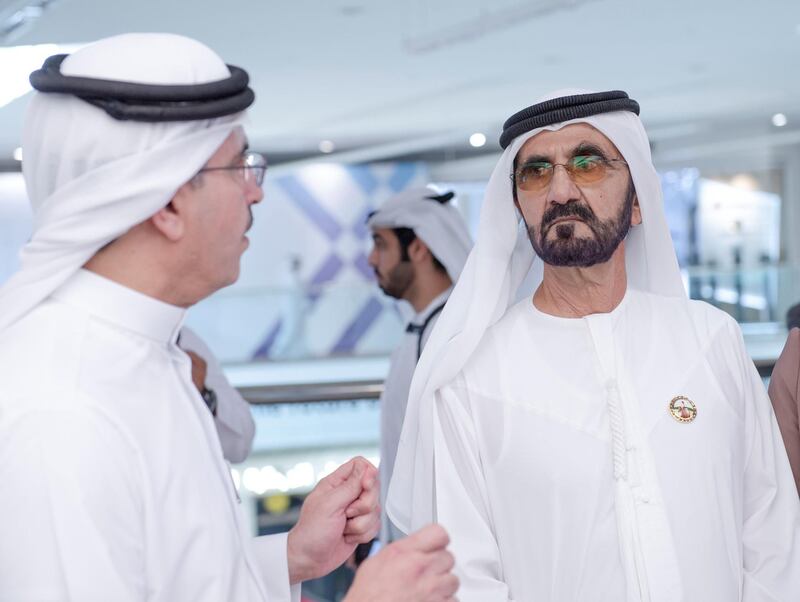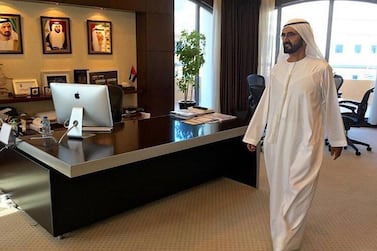A vow by the Ruler of Dubai to sack failing officials will improve public services and help achieve a culture shift in the government sector, experts predicted.
At the weekend, Sheikh Mohammed bin Rashid, Vice President and Ruler of Dubai, launched a new drive in which he laid out a series of steps designed to improve efficiency in the emirate.
Sheikh Mohammed said the heads of government departments would sign a pledge to improve services and efficiency, which will be reviewed every two years.
"Those who fail to bring about real change within two years shall be relieved of their duties," he said.
The move is aimed at bringing private sector dynamics into the public realm, analysts said, and could also boost moves towards Emiratisation by making working practices in government roles more closely aligned to those in business.
“The big difference between the public sector and private sector is that market forces force the private sector to adapt, if they don’t adapt they fail,” said Rudolph Lohmeyer, a partner at global consultancy firm A.T. Kearney’s National Transformations Institute.
“That’s not the case with government.
“The nature of public institutions is that we need them to endure through a wide range of circumstances, that’s necessary and important. But given that, how do we keep them continuously improving and evolving, since they have a mandate that ensures their existence?
“It’s got to come from leadership in the public sector. So when I read [Sheikh Mohammed’s] letter, it is an exact example of that.
“So to harness those same dynamics in government, by intensifying accountability standards, is therefore strengthening the mechanisms that will bring fresh blood continuously into key positions.
“This reflects the effort of the Dubai government to continuously refine its speed and effectiveness."

Another knock-on benefit could be to achieve a change in practices in the long-term which could level the playing field between private and private sector practices.
The Emirates has a long-standing goal of encouraging entrepreneurship among UAE citizens and of driving up Emirati participation in the private sector. The vast majority of employed Emiratis currently work in the public sector, which some see as offering more secure and comfortable employment.
“By making dynamics in government more comparable to those in the private sector, I think you increase the likelihood that people will move between public and private sector jobs,” said Mr Lohmeyer, who has worked previously as an investment banker and senior adviser at the US State Department.
“By not allowing government jobs to become static and fixed, and more comparable to private sector jobs, you make it more likely that there will be this healthy cross-fertilisation of people between those two sides of the socio-economic system.
"It’ll balance the attractiveness of public and private sector jobs; the intensity of the jobs will be more comparable.”
Among the other measures announced by Sheikh Mohammed was the establishment of the Dubai Council, a new body that will oversee six sectors; the economy, services for citizens, governmental development, infrastructure, justice and security and health and knowledge.
Setting out his vision, he said: “What worked in the past may not work in the future and what has benefitted us in the last 20 years may not benefit us in the next 20 years.
"Time forces us to change tools, renew institutions and fight stagnation.”
Mazen Houalla, associate partner at KPMG Lower Gulf, a global network of firms providing auditing and tax services, backed Sheikh Mohammed's mission to drive up standards.
"The robust governance frameworks and the opinions of the advisory boards will assist in driving the growth agenda and achieve a sustainable future for nationals and citizens," he said.
"Dubai is also harnessing the manifold benefits of public-private partnerships to yield significant growth in major sectors such as education, health and infrastructure.
"Enhancing services offered to the public – and allowing the local community to contribute to this process – is likely to assist in increasing transparency and accountability. This will aid in enabling Dubai to keep pace with economic developments and create sustainable investment opportunities."
Other moves towards creating greater accountability within Dubai include naming underperforming government centres, while Sheikh Mohammed has been known to carry out unannounced spot-checks on his departments.







